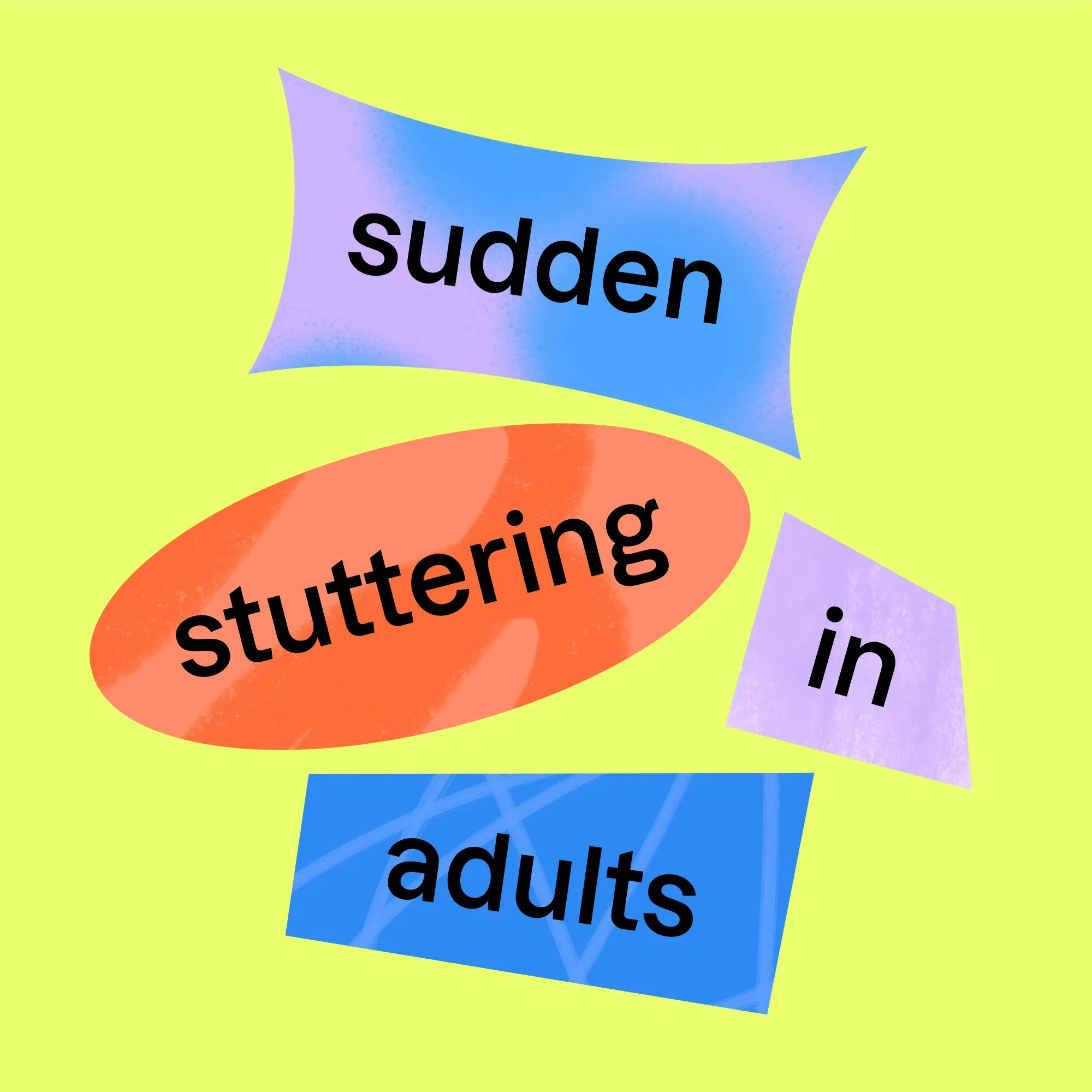Have you ever had sudden difficulty finding a word? You’re mid-sentence, scratching your head in frustration. You know the word you want to say, you just can’t get it out.
If this has happened to you, you’re not alone. Many adults report word-finding difficulty. But while not uncommon, this tip-of-the-tongue phenomenon can still feel frustrating, embarrassing, and confusing.
Thankfully, there are strategies you can use when you have word-retrieval problems. In this article, we cover everything you need to know about word-finding difficulty, including its causes, what to do when it happens, and how speech therapy can help.
Find the right speech therapist for you
We'll match you with a speech therapist who's experienced in your area of need and available when you are.
 Get started
Get startedWhat is word-finding difficulty?
Word-finding difficulty, also called anomia or word-retrieval difficulty, refers to challenges saying a known word while you’re speaking or writing.
How common is it to have trouble finding words?
Occasional anomia is a universal phenomenon. People of all ages can find it hard to find words at times. That said, it’s important to note how often it happens, since anomia is more common among people with neurological disorders. When word-retrieval problems in adults become persistent or severe, it’s a good idea to check in with your doctor.


What causes frequent word-finding difficulty?
Word-retrieval problems for adults can have several causes, such as:
Typical age-related changes to the brain
Neurological conditions, such as dementia, traumatic brain injury, Parkinson’s, multiple sclerosis, stroke, or long COVID
Mental health conditions, such as depression or anxiety
Not getting enough sleep
Alcohol or drug use


Aphasia and word-finding problems
Aphasia is a language disorder that affects a person’s ability to speak, understand, read, or write. It’s most commonly caused by a stroke or brain injury, but it can also result from progressive conditions like dementia.
Having word-finding difficulty does not mean you have aphasia. However, some people with aphasia do have trouble in this area. This is another reason it’s important to see your doctor if you're having trouble recalling words.
There are different types of aphasia. Some affect the ability to understand language. Other types affect expressive language, which would include word-finding problems. You can learn more about the different types of aphasia and how they affect speech here.


5 tips to help when you're struggling to find words
When it feels hard to find your words, it’s natural to look for a solution. Here's what speech therapists recommend trying when you’re suddenly having trouble recalling words.
1 Describe the word you’re trying to remember
Talk “around” the object, person, or place you’re trying to name. This strategy, called circumlocution, might help you retrieve the word in question. At the very least, it will help your conversational partner understand your message. An example of circumlocution would be saying, “Can you grab me the–um–thing that holds my coffee?” Your conversational partner might say, “Your mug? Sure! Here you go.”
2 Visualize the word you’re trying to recall
Sometimes you might know the first letter of the word that’s on the tip of your tongue. In these instances, visualize that letter. In our previous example, you might visualize the letter “m.” You might also share this detail out loud: “It starts with an m…”
Take our free screener
Do you want to improve your communication? Take our online screener and find out if you or a loved one could benefit from speech therapy.
 Start the screener
Start the screener3 Try to relax
Easier said than done, but try to remain calm if you forget a word. The more pressure you put on yourself to retrieve the word, the harder it will be. Take a breath and pause. If the word doesn’t come to you, no problem! Try another strategy, or keep the conversation moving. More likely than not, the word will pop into your head eventually.
4 Write a script ahead of time
Do you have an upcoming doctor’s appointment or a meaningful conversation with a loved one? Try scripting what you want to say beforehand. Write it out and practice it. You won’t be able to script every conversation, but you can use this strategy when precision is especially important.
5 Take care of your brain health
Research shows that getting enough sleep, exercising regularly, eating a healthy diet, and being involved in social activities can improve your brain health. This, in turn, can improve your cognitive-linguistic functioning and your ability to recall words.


Tips to help a loved one with word-finding difficulty
Conversation is a two-way street. If your loved one is forgetting words, there are things you can do to support them with word-retrieval problems.
Avoid quizzing. While your intentions might be good, asking questions while withholding the answer can be stressful, especially for people with word-finding difficulty. Instead of asking questions (for example, “Where did you go to eat? Come on…I know you know the name of that restaurant”), make statements: “I see you brought home leftovers from Tony’s Cafe. Yum!”


Fill in the blanks, with permission. Ask your loved one if they’d like you to intervene when they can’t recall a word. They might prefer that you check with them before you guess the word you think they’re describing. They might also ask you to give them the first letter of the word in question.
Keep the conversation going. The ultimate goal of conversation is for two people to connect with each other. Focus on moments of connection with your loved one. Try not to let interruptions due to anomia define your interaction with them.
Word-finding difficulty can be frustrating. Next time this happens to you or a loved one, keep these strategies in mind to help improve the conversation. And if your trouble finding words is getting worse or interfering with your everyday life, don’t hesitate to contact your health care provider.


Speech therapy can help with word-finding difficulties
If you regularly struggle to find your words, it’s important to talk with a speech therapist. Speech therapists are experts in cognitive-communication and are trained to help people with word retrieval.
A speech therapist can perform an evaluation to determine what's causing your word-finding problems. They will create a treatment plan that includes personalized activities and tasks to strengthen your ability to recall words. Depending on your needs, your speech therapist might use evidence-based treatments such as Semantic Feature Analysis (SFA), Verb Network Strengthening Treatment (VNeST), Semantic Priming to Improve Comprehension and Expression of Sentences (SPICES), generative naming tasks, and more!
Get matched with a speech therapist today
If you or a loved one are having trouble with word-finding, reach out to Expressable today. We’re here to listen to your concerns and guide you on next steps. We can match you with a licensed speech therapist who can perform an evaluation and tailor a treatment plan to your needs. Get in touch with us here!
Frequently asked questions
1. What is word-finding difficulty, and how can it impact daily life?
Word-finding difficulty, also called anomia, happens when you can't find the right words when speaking or writing. This can make it hard to communicate clearly and may cause frustration in everyday conversations. If you often have trouble finding words, try our free screener to check on your or your loved one's language skills.
2. How can I tell if my word-finding difficulty is part of a larger issue?
It's normal to sometimes struggle to find words. But if it happens a lot, it might be due to a bigger problem, like a neurological disorder or mental health issue. If word-finding issues are affecting your daily life, it might be helpful to schedule an evaluation with a speech therapist.
3. What strategies can I use to improve my word recall?
You can try describing the word (known as circumlocution) or picturing the first letter to help you remember words. A speech therapist can teach you more strategies that are personalized to you.
4. How can speech therapy help with word-finding difficulties?
Speech therapy offers treatment to improve your ability to find words. A speech therapist can teach you effective strategies and exercises. Click here to get matched with a speech therapist who's right for your needs.
5. When should I seek professional help for word-finding difficulty?
If your word-finding difficulty doesn't go away, is getting worse, or is affecting your life, it's important to get professional help. Start with our free screener to evaluate your speech and language skills and see if you need further evaluation.
How Expressable Can Help
Concerned your child isn't reaching age-expected milestones? Looking for communication support from a professional? Expressable is a national online speech therapy practice serving children and adults. We treat all major areas of communication and feeding, offer flexible hours including evenings and weekends, and accept most major health insurance plans. We’re proud to have earned more than 3,000 5-star reviews from our clients (4.9/5 average).
Our therapy model is centered on parent and caregiver involvement. Research proves that empowering caregivers to participate in their loved one’s therapy leads to better outcomes. That’s why we combine live, 1-on-1 speech therapy with personalized education and home practice activities for faster progress.
Communication is more than words. It’s how we share how we feel and show who we are. We’re here to help you or your child do just that.

 Maggie Clerkin, M.S., CCC-SLP
Maggie Clerkin, M.S., CCC-SLP












